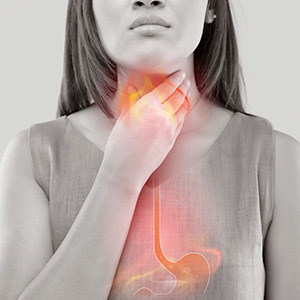
Get to the Root Cause of GERD and Learn How to Get Relief
GERD (gastroesophageal reflux disease) affects millions of people with its frequent symptoms like burning chest pain, regurgitation, and cough. Unfortunately, many don't realize that GERD isn't simply an ordinary digestive condition – it's actually indicative of a deeper gastrointestinal disorder or imbalance that needs to be addressed. In this blog post, we'll explore the root causes of GERD and discuss how different lifestyle changes, medications, and treatments can help you find relief from your symptoms.
What are GERD and its symptoms?
Gastroesophageal reflux disease, commonly known as GERD, is a chronic condition that affects millions of people worldwide. Its symptoms include heartburn, chest pain, difficulty swallowing, and regurgitation of acid. While occasional acid reflux is normal, frequent episodes can lead to serious health problems like esophageal cancer. There are several causes of GERD, including obesity, pregnancy, and hiatal hernias. GERD relief can be found through several methods, including lifestyle changes, medications, and surgery. It is important to seek medical attention if symptoms persist or worsen, as early diagnosis and treatment can ultimately improve quality of life.
Causes of GERD and their effects on the digestive system
GERD, or gastroesophageal reflux disease, is a digestive disorder that occurs when acidic stomach contents travel back up into the esophagus, causing irritation and discomfort. There are several causes of GERD, including obesity, pregnancy, and hiatal hernia. Additionally, certain lifestyle choices such as smoking, consuming caffeine or alcohol, and eating large meals before bedtime can also contribute to GERD. The effects of GERD on the digestive system can range from mild discomfort to more serious complications, such as Barrett's esophagus or esophageal cancer. Luckily, there are many options for GERD relief, including lifestyle changes, medication, and surgery in severe cases. Understanding the causes of GERD and its effects on the digestive system can help individuals make informed choices about their health and seek appropriate treatment when necessary.
How GERD can be triggered by lifestyle choices
GERD, or gastroesophageal reflux disease, is a common condition that affects millions of people around the world. Lifestyle choices are often a major factor in triggering GERD symptoms, such as heartburn, regurgitation, and chest pain. Some of the most common triggers include eating large meals, consuming acidic or spicy foods, drinking alcohol and caffeine, smoking, and being overweight or obese. Fortunately, there are several lifestyle changes you can make to help relieve GERD symptoms, such as eating smaller meals, avoiding trigger foods, quitting smoking, and losing weight. By making these changes, you can not only reduce the symptoms of GERD but also improve your overall health and well-being.
Diet & Nutrition Tips for Improving GERD symptoms
Gastroesophageal reflux disease (GERD) can be an uncomfortable and painful condition to deal with. While medication can help alleviate symptoms, adjusting your diet and nutrition can also play a crucial role in managing GERD. Certain foods like citrus, spicy, and fatty foods can trigger GERD symptoms, leading to irritation and discomfort. However, incorporating foods like lean proteins, whole grains, fruits, and vegetables can provide GERD relief. Additionally, taking small, frequent meals and avoiding lying down immediately after eating can also help. Identifying and avoiding GERD causes by making dietary changes can lead to a significant improvement in symptoms, making the condition more manageable.
Natural remedies to reduce discomfort from GERD
Gastroesophageal reflux disease (GERD) is a common condition that causes discomfort and even pain in the chest due to the regurgitation of stomach acid. The good news is that there are several natural remedies that can help reduce the discomfort from GERD. One of the most effective ways is to make certain dietary changes. Avoiding acidic or spicy food can help minimize the risk of reflux. Additionally, consuming foods that are alkaline, such as ginger, can help neutralize excess stomach acid. Other natural remedies to consider include aloe vera juice, chamomile tea, and slippery elm. By incorporating these remedies into your daily routine, you can find relief from the discomfort caused by GERD and discover a more natural way of living your life without the symptoms.
Understanding the benefits of medication options for treating GERD
GERD, or gastroesophageal reflux disease, is a condition that affects millions of people around the world. This chronic digestive disorder can cause discomfort and pain, making it essential to find effective treatments that can provide relief. If you are living with GERD, there are several medication options available that can help alleviate the symptoms and lead to a better quality of life. Understanding the different types of medications and how they work can help you make informed decisions about your treatment plan. It is essential to consult your doctor to determine the right medication for you based on the causes and severity of your GERD symptoms. With the right medication and treatment plan in place, you can manage your GERD and find much-needed relief.
